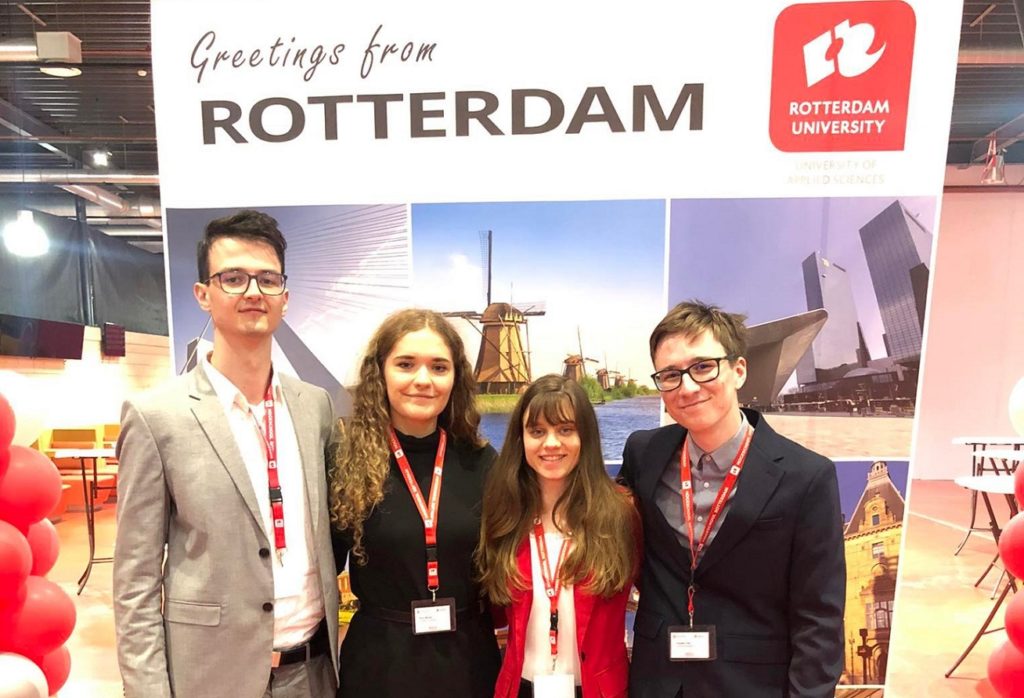Students represented our university at the Rotterdam Business Case Solving Competition

Last semester, the Rotterdam/Carleton International Case Competition was held in Rotterdam. A team of Corvinus students (Fanni Fakli, Éva Molnár, Tristan Tóth, and András Zareczky) participated in the competition, which was held in Canada and the Netherlands.
The team members completed the Case Track, a series of courses to prepare for case solving, the last of which is Cases on International Business Strategy. The team was prepared for the competition by Miklós Kozma, Associate Professor at the Institute of Entrepreneurship and Innovation.
The special feature of the competition was its format. “It could really be compared to a football group match. In the division, we competed against three other universities, but in each round we only played one university. 13 points were distributed between the two teams based on their performances,” says Fanni Fakli about the competition.
In the division, our team competed against teams from the University of Vermont, Grossman School of Business (USA), the Chinese University of Hong Kong (China), and the host, Rotterdam University of Applied Sciences (Netherlands). The unusual format included an intensive schedule. The teams solved three cases, each lasting six hours, on consecutive days. At the end of the six hours, the teams appeared without a break before the professional jury, to whom they presented their solutions in 15 minutes, followed by a 10-minute Q&A session.
Given the time constraints, good teamwork was essential and the team excelled in that. “Our team was in complete harmony throughout the competition, everyone knew what they were doing, and we worked as one team through the three days of solving,” says Éva Molnár of the work.
The short solution was made easier by the fact that the companies that provided the cases were revealed to the public a month before the competition. This gave each team the opportunity to prepare and gather as much information as possible from a diverse range of companies and industries.
The first case was a floriculture company called Florensis, who asked teams to come up with an innovative sustainability strategy. “We won the first round 8-5 against a local team. This was the case of Florensis, which we were initially afraid of. Although it did not seem like it at first, as we prepared, it gradually became clear that the workings of the flower market are more complex than we thought,” say the competitors.
The second day was about the Kanata North Business Association, a Canadian organisation that runs a technology park that they hope to develop into a modern and liveable innovation city.
The third case was Vebego, one of the largest family-owned companies in the Netherlands, providing building management and cleaning services throughout Europe. They wanted to know how they could meet the needs of their stakeholders while growing sustainably.
The second and third matches were won by our opponents by a small margin, so our team did not make it to the final. As a testament to the fierce competition to progress, the first- and third-place winners in the final were from their respective divisions.
“The team and I are proud of ourselves. We put in a lot of work and time in preparation and competed to the best of our abilities and abilities in the live competition. We have definitely gained a very positive experience, which was a result of problem-free, efficient, and enjoyable teamwork, as well as a lot of experience and development opportunities,” says Fanni.
Tristan Tóth also confirmed that completing the subjects relating to the Case Track and competing in the case competition provide him with professional knowledge that is unique and will give him an advantage in his future career. ‘The experience and knowledge gained during the 3 days will undoubtedly be irreplaceable and valuable in my academic and professional career.’
“The unusual format required a different kind of preparation and brought out differences between the teams that we don’t normally encounter. The winning US team solved the cases with a novel approach that we were able to explore and understand during the rounds. We will incorporate the knowledge gained during the competition into our own Corvinus annual know-how development cycle. All in all, it was a professionally organised, high-quality competition, a great experience for both the students and the coaches,” said Miklós Kozma about his experience.
Congratulations to the team for their successful preparation and good performance.